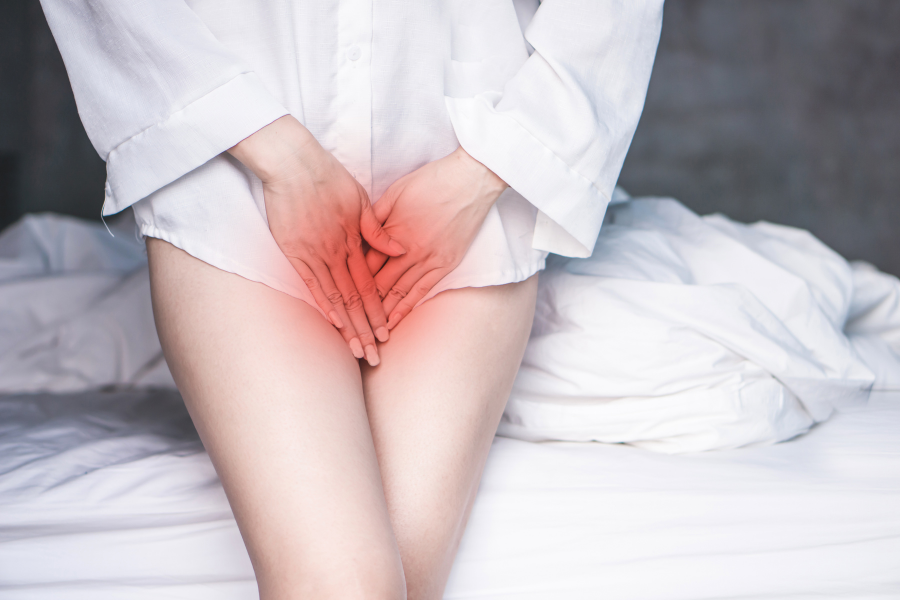
Women can experience a wide array of vaginal problems that go undiagnosed for years because many are too embarrassed to inform their doctors about them. However, failing to speak up can lead to worsening symptoms when viable treatments are available.
According to Dr. Tahery, an expert in diagnosis and treatment of vulvar and vaginal disorders, one lesser-known condition that can affect women of all ages is lichen sclerosus. This relatively rare condition can occur throughout the body, but it’s most common in the genital and vaginal areas.
Lichen sclerosus is a non-STD inflammatory condition that can severely impact a woman’s quality of life. Once it develops, lichen sclerosus can cause itchy and painful patches of thin, wrinkled, and discolored skin to develop. The lichen sclerosus symptoms can change the appearance of the labia while causing significant pain during intercourse and when urinating. While lichen sclerosus is chronic, many treatments are available to relieve symptoms.
Signs and Symptoms of Lichen Sclerosus
This condition can affect any body part, including the back, upper shoulders, breasts, and arms. However, it most commonly affects the genitals and anal regions. Lichen sclerosus symptoms can be mild, and many people don’t realize they have the condition for years because they don’t show any symptoms. But when they develop, the symptoms can worsen over time.
The first symptoms to appear are typically small, pink, or white lesions. However, those lesions can graduate to larger patches of white, wrinkly, tissue-like skin. As the skin worsens, those patches can get itchy and painful. Due to the skin’s delicate texture and sensitive location, even mild scratching can cause bleeding.
Other lichen sclerosus symptoms include:
- Soreness
- Burning sensations
- Bruising
- Blotchy skin coloring
- Bleeding or blistering sores
- Changes in urination
- Discomfort during urination
- Pain during sex
Women may also experience physical changes. For example, lichen sclerosus symptoms often include skin thinning, tightening, and shrinkage around the labia. It can make the labia appear flat or cause the vaginal opening to appear smaller. Those symptoms can result in significant pain and may change urine flow.
RELATED: Will Labiaplasty Get Rid Of Camel Toe
What Causes Lichen Sclerosus?
Unfortunately, there are no clear lichen sclerosus causes. The medical field is still learning about the condition, but several studies show a few potential links. Contrary to popular belief and first reactions, sexually transmitted diseases are not among the possible lichen sclerosus causes. Instead, researchers believe it could be a byproduct of genetics, hormonal changes, immune system response, and other factors.
Some studies suggest that people have a genetic predisposition to lichen sclerosus. In those cases, researchers believe that trauma or injury to the affected area can trigger the condition to develop.
It could also be the effects of an autoimmune disorder. In those cases, the immune system attacks healthy skin cells, resulting in lichen sclerosus symptoms.
Hormonal imbalances may also be among the potential lichen sclerosus causes. The link between lichen sclerosus and hormones isn’t well-known, but some theories suggest that low estrogen levels could be to blame.
The reason for that theory comes down to who it affects most. Men and women of all ages can develop lichen sclerosus. However, estimates say it affects up to ten times as many women as it does men. And the age group that deals with lichen sclerosus symptoms most are postmenopausal women.
RELATED: Why is my Labia Shrinking?
Lichen Sclerosus Diagnosis and Treatment
No matter the lichen sclerosus causes, there are treatments available. This condition is chronic. Once it develops, it often affects women for the rest of their lives. The good news is that lichen sclerosus treatment can help keep symptoms under control while addressing pain and discomfort.
Before treatment, a doctor must diagnose lichen sclerosus. This typically occurs through a physical examination. Healthcare providers may also order a biopsy.
Once confirmed, doctors can work with patients to determine the best course of action. Topical medications are a viable lichen sclerosus treatment. Doctors may prescribe topical steroids that reduce inflammation and itching. Steroids are usually the first-choice treatment. Other topical medications to treat this condition include Calcineurin inhibitors and retinol. Retinol is a form of Vitamin A that encourages skin cell turnover. Meanwhile, Calcineurin inhibitors suppress the immune system’s response to the area to treat inflammation.
An alternative to topical lichen sclerosus treatment options is oral medications and phototherapy. Oral retinol and immunosuppressants may help to keep inflammation and pain under control. Phototherapy may do the same via exposure to ultraviolet light at safe wavelengths.
Besides the itching, pain, and discomfort, if untreated lichen sclerosis can cause cancer of the genitalia in some patients.
If you’re dealing with the effects of lichen sclerosus, don’t hesitate to reach out to the offices of Dr. Michael Tahery. Dr. Tahery is a board-certified OB/GYN and one of the most active urogynecological surgeons in the Los Angeles area. Dr. Tahery has over two decades of experience helping women by treating a wide array of vaginal and reproductive conditions. Contact our offices to schedule your appointment with Dr. Tahery today and explore possible lichen sclerosus treatment options.